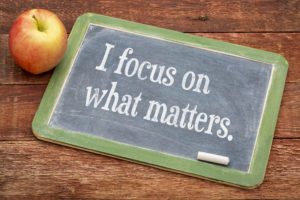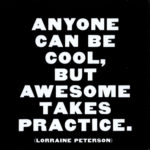 Did you know that the word ‘priority’ was part of the English language for 500 years before it became pluralized? 500 years!
Did you know that the word ‘priority’ was part of the English language for 500 years before it became pluralized? 500 years!
Why should you care about this little linguistic tidbit? Because it offers insight into why your mission statement may be–how shall we say?–sub-awesome.
You see, it wasn’t until 1940s that we started having priorities. Plural. That’s when the trouble started.
We got into the (nasty) habit of believing that all tasks were created equal and that all of them had to get done. We no longer had a priority, i.e. a clear idea of the “thing that was most important”. We started having priorities, i.e. things that were all important.
If everything is equally important, how can you prioritize? How can you focus? How can you convey the one thing that is most important about your organization? You can’t!
And that, I’m pretty darn sure, is contributing to the Laundry List approach to creating Mission Statements, which is leading to ~50% of nonprofits having Mission Statements that are technically incomprehensible.
I’ve said it before and I’ll say it again (because it warrants repetition)–if you tell someone your everything, they will remember nothing.
Listen to this week’s podcast and learn more about the power of having a priority. One. Singular. Priority.
 Used to be that if I just worked hard enough, I could tick all the things off my to-do box that needed to get done. “Perfect!”, I would exclaim at the end of the day.
Used to be that if I just worked hard enough, I could tick all the things off my to-do box that needed to get done. “Perfect!”, I would exclaim at the end of the day. As I was walking into the office this morning, a woman with a jaunty ponytail was wheeling a trolley filled with boxes through a set of double doors. I had to wait about 8 seconds for her to maneuver through the door. As she passed me, she said, “So sorry to make you wait.”
As I was walking into the office this morning, a woman with a jaunty ponytail was wheeling a trolley filled with boxes through a set of double doors. I had to wait about 8 seconds for her to maneuver through the door. As she passed me, she said, “So sorry to make you wait.” In sifting through the data from our
In sifting through the data from our 

 Small words matter. They can be oh so powerful. Yet they bounce off of our lips so quickly that you hardly notice them. But notice them you should!
Small words matter. They can be oh so powerful. Yet they bounce off of our lips so quickly that you hardly notice them. But notice them you should! As you know, dear reader, I have a love/hate relationship with Mission Statements.
As you know, dear reader, I have a love/hate relationship with Mission Statements. I have this quote framed. It sits in a spot where I see it all the time. Namely, above my kitchen sink. (When will dishes learn to wash themselves?!)
I have this quote framed. It sits in a spot where I see it all the time. Namely, above my kitchen sink. (When will dishes learn to wash themselves?!) Whether a word is “good” or not is largely a matter of opinion. For instance,
Whether a word is “good” or not is largely a matter of opinion. For instance,